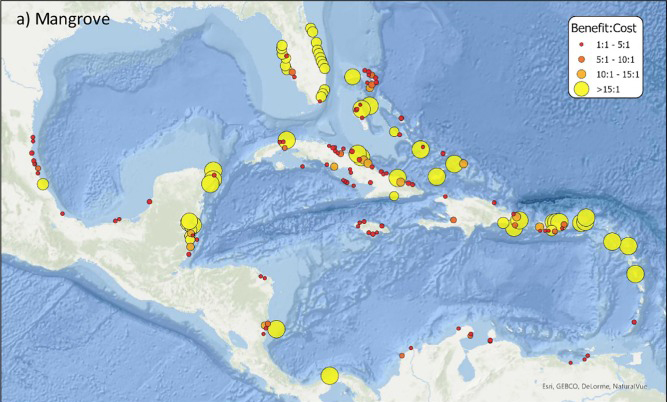NOTICIAS
Researchers from IHCantabria demonstrate that the restoration of mangroves and coral reefs is a cost-effective solution to protect against coastal flooding

Saúl Torres-Ortega and Iñigo J. Losada, researchers at IHCantabria and professors at the Universidad de Cantabria, are authors ―together with other researchers― of the article “Return on investment for mangrove and reef flood protection” published in the international journal Ecosystem Services.
Some coastal ecosystems, such as coral reefs and mangroves, act as natural barriers against waves and storm surges, reducing the damage caused by flooding to people and property. In many places, however, the degradation of coastal reefs and wetlands has reduced their natural ability to protect shorelines from flooding and erosion.
There are effective strategies to restore the critical state of these ecosystems. Still, the funding needed to do so is often hard to find, as it is scarce and affected by spending for recovery from natural hazards and disasters. Explained in numbers: Global spending on disaster recovery is more than 100 times greater than conservation spending, and necessary expenditures on biodiversity are $100 billion annually. Yet, the international community only spends $4-10 billion annually on conservation and management.
Under this framework, the study provides rigorous assessments -using methods from the insurance sector and risk analysis- of these natural defences and demonstrates that they can offer a positive return on investment since it indicates the benefits derived from reducing the flood damage exceed restoration costs. There are many places in the Caribbean where habitat restoration for risk reduction could be cost-effective, opening up significant opportunities to pay for the needed restoration.
In this sense, the study results indicate new avenues of opportunity to support efforts to restore natural habitats through entities that already support risk reduction, climate adaptation and disaster recovery with their financing. Today, these funding sources traditionally supported by artificial or “grey infrastructure” can be redirected toward nature-based solutions by investing in restored “natural defences” that provide multiple benefits beyond coastal protection. In fact, this investment would benefit up to 100,000 dollars per hectare in some parts of the Caribbean, considering the reduction of damage from coastal flooding.
Among the co-authors of the work are, ―in addition to Saúl Torres-Ortega and Iñigo J. Losada― Michael W. Beck as the principal author, and Nadine Heck, Siddharth Narayan, Pelayo Menéndez, Borja G. Reguero and Stephan Bitterwolf from the University of Santa Cruz (United States); Glenn-Marie Lange of the World Bank; Kerstin Pfliegner from ERM (Germany); and Valerie Pietsch McNulty of the Nature Conservancy.
The Kingfisher Foundation, the World Bank, AXA XL, AXA, the Research Fund, the Nature Conservancy, and the German Federal Ministry for the Environment, Nature Conservation, and Nuclear Safety have partly supported this work.
To deepen:
“Return on investment for mangrove and reef flood protection”, Ecosystem Services, 2022; 56: 101440 DOI.



